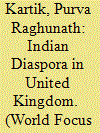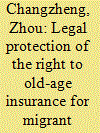|
|
|
Sort Order |
|
|
|
Items / Page
|
|
|
|
|
|
|
| Srl | Item |
| 1 |
ID:
111051


|
|
|
| 2 |
ID:
128176


|
|
|
|
|
| Publication |
2014.
|
| Summary/Abstract |
After 1950s a large number of Indians migrated to United Kingdom (UK) with cultural, traditions and religious values and practices, which included practice of caste discrimination too. As Dr. BR Ambedkar anticipated, the Indian migrants will carry the caste system to other regions of earth and it would become a problem of the world. This prediction came true as cast discrimination has indeed migrated with the Indian Diaspora to east and south Africa, Mauritius, Fiji, Surinam, the middle east (for example in Bahrain, Kuwait, the United Arab Emirates), Malaysia, the Caribbean, the United Kingdom, North America, and other regions (Natural 2001). With the other Indian Diaspora dalits (untouchables) of India also migrated to the UK. It has been estimated that around 250000 dalits are living in the UK (CERD 79, UK Report.).
|
|
|
|
|
|
|
|
|
|
|
|
|
|
|
|
| 3 |
ID:
093046


|
|
|
| 4 |
ID:
140842


|
|
|
|
|
| Summary/Abstract |
China’s main comparative advantage in international competition is its cheap labour, mostly migrant workers from rural areas. Migrant workers play an important role in the economic development of China. Since 1978 when China began to adopt the reform and opening-up policy, more and more migrant workers have poured into cities and towns to seek better employment opportunities. However, besides low wages, they have to endure long working hours and dangerous working environments. In addition, many employers do not contribute social insurance for migrant workers at all, leaving them vulnerable to unexpected living costs. According to a survey conducted in the Yangtze Delta Region by the Legal Aid Program for Migrant Workers at Nanjing University in August 2009, only 39.3 per cent of migrant workers have pension schemes, and 31.5 per cent of migrant workers have not joined any social insurance schemes of any sort. In some cities such as Wenzhou, even fewer are covered, as only 15.4 per cent of migrant workers have a pension scheme and 50 per cent of migrant workers have not joined any social insurance scheme. When migrant workers become old, sick, unemployed or injured in industrial accidents, they fall into poverty because they cannot apply for social insurance benefits. Among these problematic issues, old-age insurance should be specifically highlighted because more migrant workers are reaching their retirement age. There has been an increasing number of pension cases filed at the courts of law. However, many courts refuse to proceed with the hearings of these social insurance cases, or apply inappropriate legal doctrines in the trial process. It is also almost impossible for migrant workers to get legal redress for their pension benefits when their employers fail to comply with the law and contribute fees for them. It is imperative for the Chinese government to unify the old-age insurance system countrywide.
|
|
|
|
|
|
|
|
|
|
|
|
|
|
|
|
|
|
|
|
|